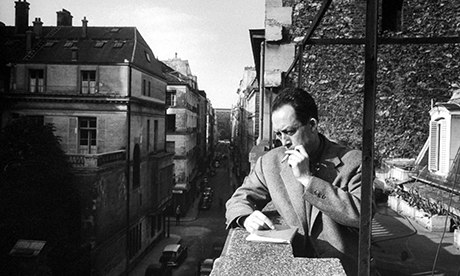I was first drawn to Albert Camus because he looked so cool in his trenchcoat, because the Cure wrote a song inspired by one of his books and because he was an existentialist

Albert Camus Photograph: Loomis Dean/Time & Life Pictures/Getty Image
I was drawn to Albert Camus because he looked so cool in his trenchcoat, because the Cure wrote a song inspired by one of his books (The Outsider), because he and his pug-ugly friend Sartre were existentialists (which seemed related, somehow, to the trenchcoat). Their falling-out could hardly have been more acrimonious but, as can happen, the rupture contained a measure of agreement: both accepted that Camus had never really been an existentialist.
For him this was a matter less of intellect than of temperament, of the defining facts of his early life: being born (100 years ago this week) into a world of sunlight and poverty in Algiers. It was the discovery of the essays celebrating his childhood and youth that altered my perception of him, from a thinker to a writer whose intellectual lucidity was a product of the wealth – the sensual immediacy and clarity – that had been heaped on his senses. The trenchcoat, in other words, came later. As did his participation in the resistance during the second world war (a subject that finds allegorical expression in The Plague) and the heretical willingness to take a stand against Stalinism and the Communist party (while Sartre enthusiastically toed the line). The Algerian war trapped him in an impossibly vexed position. Unable to support a liberation movement whose tactics could "strike blindly" against his mother, he was reduced, in Tony Judt's words to "impotent silence".
The journey Camus made was enormous – a telegram explaining that he had won the Nobel prize had to be read to his illiterate mum by a neighbour – but it brought him back, in The First Man, the novel he was working on at the time of his death in 1960, aged 46, to the land and history that had formed him. The narrator of The Plague concludes, simply, that "there is more in men to admire than to despise". Camus was equally convinced of a more private truth, that he carried within him "an unconquerable summer". It still warms us today.
For him this was a matter less of intellect than of temperament, of the defining facts of his early life: being born (100 years ago this week) into a world of sunlight and poverty in Algiers. It was the discovery of the essays celebrating his childhood and youth that altered my perception of him, from a thinker to a writer whose intellectual lucidity was a product of the wealth – the sensual immediacy and clarity – that had been heaped on his senses. The trenchcoat, in other words, came later. As did his participation in the resistance during the second world war (a subject that finds allegorical expression in The Plague) and the heretical willingness to take a stand against Stalinism and the Communist party (while Sartre enthusiastically toed the line). The Algerian war trapped him in an impossibly vexed position. Unable to support a liberation movement whose tactics could "strike blindly" against his mother, he was reduced, in Tony Judt's words to "impotent silence".
The journey Camus made was enormous – a telegram explaining that he had won the Nobel prize had to be read to his illiterate mum by a neighbour – but it brought him back, in The First Man, the novel he was working on at the time of his death in 1960, aged 46, to the land and history that had formed him. The narrator of The Plague concludes, simply, that "there is more in men to admire than to despise". Camus was equally convinced of a more private truth, that he carried within him "an unconquerable summer". It still warms us today.
No comments:
Post a Comment